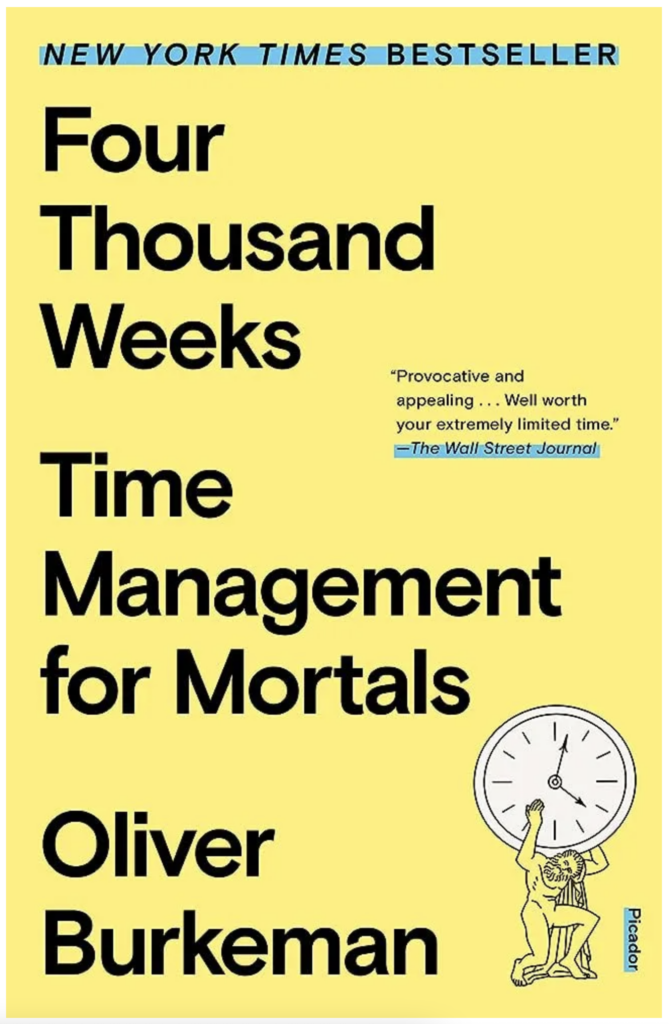
Time Management Mistakes – ข้อผิดพลาดในการจัดการเวลาที่พวกเราต่างก็กำลังทำกันอยู่ อ้างอิงจากหนังสือ New York Times Bestseller ชื่อดัง ” Four Thousand Weeks, time Management for Morals” เขียนโดย Oliver Burkenman
โดย Parker Klein ได้ทำการสรุปเอาไว้ว่า มีข้อผิดพลาดอยู่ 9 ประการดังต่อไปนี้

1. คุณพยายามทำมากขึ้นและไม่ได้ตัดสินใจว่าจะเน้นไปที่เรื่องอะไร?
“เวลารู้สึกเหมือนสายพานลำเลียงที่ผ่านพ้นไม่ได้ นำงานใหม่มาให้เราเร็วที่สุดเท่าที่เราจะจัดส่งงานเก่าได้ และการมี “ประสิทธิผลมากขึ้น” ดูเหมือนจะทำให้สายพานเร็วขึ้น” — เอ็ดเวิร์ด ที. ฮอลล์
เมื่อผู้คนทำเงินได้มากพอที่จะสนองความต้องการ พวกเขาเพียงแค่ค้นหาสิ่งใหม่ที่ต้องการและไลฟ์สไตล์ใหม่ที่ต้องการ ปัญหาที่แท้จริงไม่ใช่เวลาอันจำกัดของเรา ปัญหาที่แท้จริงคือเราได้รับมรดกมาโดยไม่รู้ตัว และรู้สึกกดดันที่ต้องดำเนินชีวิตตามแนวคิดที่ยุ่งยากเกี่ยวกับการใช้เวลาอันจำกัดของเรา ซึ่งทั้งหมดนี้รับประกันได้เลยว่าจะทำให้สิ่งต่างๆ แย่ลง เนื่องจากการเลือกที่ยากลำบากเป็นสิ่งที่หลีกเลี่ยงไม่ได้ สิ่งสำคัญคือการเรียนรู้ที่จะทำให้พวกเขามีสติ ตัดสินใจว่าจะมุ่งเน้นอะไรและจะละเลยอะไร แทนที่จะปล่อยให้พวกเขาถูกเลือกโดยไม่ได้ตั้งใจ
คำแนะนำของ Warren Buffet เขาบอกว่า เขียนรายการ 25 สิ่งที่คุณต้องการในชีวิต จากนั้นจัดเรียงตามลำดับจากที่สำคัญที่สุดไปน้อยที่สุด 5 อันดับแรกควรเป็นคนที่คุณจัดเวลาไว้ ส่วนที่เหลืออีก 20 รายการควรหลีกเลี่ยงเป็นอย่างมากไม่ว่าจะด้วยวิธีใดก็ตาม เนื่องจากเป็นความทะเยอทะยานที่สำคัญแต่ก็ไม่เพียงพอสำหรับคุณ พวกเขาหันเหความสนใจของคุณจากแก่นแท้ของชีวิตที่สำคัญที่สุด
คำถามที่คุณต้องตอบตัวเองก็คือ ลำดับความสำคัญสูงสุดของคุณคืออะไร?
2. คุณให้ความสำคัญกับอนาคต
แทนที่จะใช้ชีวิตแบบธรรมดาๆ ไปตามกาลเวลา กลายเป็นเรื่องยากที่จะไม่ให้ความสำคัญกับแต่ละช่วงเวลาโดยยึดตามประโยชน์ของมันเพื่อเป้าหมายในอนาคต หรือโอเอซิสแห่งความผ่อนคลายในอนาคตที่คุณหวังว่าจะไปถึงเมื่องานของคุณ “หมดไปจากโลก” ในที่สุดทาง
“มันดึงเราออกจากปัจจุบัน นำไปสู่ชีวิตที่มุ่งไปสู่อนาคต กังวลว่าสิ่งต่างๆ จะผ่านไปด้วยดี ประสบกับทุกสิ่งในภายหลังอย่างหวังผล ความสงบในจิตใจจึงไม่ค่อยมาถึง “เราทำงานในแต่ละวันอย่างกระตือรือร้นและไร้ความคิดเกินกว่าที่จำเป็นต่อการดำรงชีวิต เพราะสำหรับเราแล้ว การไม่มีเวลาว่างเพื่อหยุดคิดนั้นจำเป็นยิ่งกว่า ความเร่งรีบนั้นเป็นสากลเพราะทุกคนกำลังหนีจากตัวเขาเอง” — นิทเช่
คำถามที่คุณต้องตอบตัวเองก็คือ ขณะนี้คุณรู้สึกอย่างไร? คุณต้องทำอะไรตอนนี้?
3. คุณเพิกเฉยต่อข้อจำกัดของคุณ
ไม่มีเทคนิคการบริหารเวลาใดที่จะมีประสิทธิภาพเพียงครึ่งเดียวเท่ากับการเผชิญกับสิ่งที่เป็นอยู่อย่างแท้จริง เมื่อคุณมั่นใจว่าสิ่งที่คุณพยายามทำนั้นเป็นไปไม่ได้แล้ว การตำหนิตัวเองต่อความล้มเหลวจะยากขึ้นมาก
ทัศนคติที่จำกัดเวลาหมายถึงการจัดวันของคุณด้วยความเข้าใจว่าคุณจะไม่มีเวลาอย่างแน่นอนสำหรับทุกสิ่งที่คุณต้องการทำ หรือที่คนอื่นต้องการให้คุณทำ และอย่างน้อยที่สุด คุณก็สามารถหยุดเอาชนะได้ ตัวเองพร้อมที่จะล้มเหลว
ในทางเทคนิคแล้ว การรู้สึกลำบากใจกับรายการสิ่งที่ต้องทำที่ล้นหลามนั้นไม่มีเหตุผล คุณจะทำสิ่งที่คุณทำได้ คุณจะไม่ทำสิ่งที่คุณทำไม่ได้ และเสียงภายในที่กัดดันนั้นยืนยันว่าคุณต้องทำทุกอย่างนั้นเป็นเพียงความผิดพลาด
เมื่อมีมากเกินไปที่ต้องทำ เส้นทางเดียวที่นำไปสู่อิสรภาพทางจิตใจคือ การละทิ้งจินตนาการที่ไร้ขีดจำกัดในการทำทุกอย่างให้สำเร็จ และมุ่งความสนใจไปที่การทำบางสิ่งที่สำคัญแทนคือเรื่องที่ควรทำมากที่สุด
ไม่ใช่การปรับปรุงแบบค่อยเป็นค่อยไป แต่เป็นการเปลี่ยนแปลงมุมมองที่จะกำหนดกรอบใหม่ให้กับทุกสิ่ง เมื่อคุณไม่จำเป็นต้องโน้มน้าวตัวเองอีกต่อไปว่าคุณจะทำทุกอย่างที่ต้องทำ คุณก็จะมีอิสระที่จะมุ่งความสนใจไปที่การทำบางสิ่งที่สำคัญได้
คำถามที่คุณต้องตอบตัวเองก็คือ คุณเคยหลีกเลี่ยงข้อจำกัดอะไรบ้าง และคุณจะยอมรับได้อย่างไร?
4. คุณแสวงหาความสุขและประสบการณ์
การเติมเต็มชีวิตด้วยกิจกรรมที่น่าพึงพอใจ มักไม่ค่อยน่าพึงพอใจเกินกว่าที่คุณคาดหวัง
ยิ่งคุณประสบความสำเร็จในการมีประสบการณ์ที่ยอดเยี่ยมมากเท่าไร คุณก็ยิ่งเริ่มรู้สึกว่าคุณสามารถมีหรือควรจะมีมากขึ้นเท่านั้น นอกเหนือจากประสบการณ์ที่คุณมีอยู่แล้ว ผลที่ตามมาคือความรู้สึกของการดำรงชีวิตอยู่มีล้นเหลือมากขึ้นเรื่อยๆ สำหรับการดำรงชีวิตอยู่ สิ่งที่จำเป็นคือความตั้งใจที่จะต่อต้านความอยากบริโภคประสบการณ์มากขึ้นเรื่อยๆ
เนื่องจากกลยุทธ์ดังกล่าวสามารถนำไปสู่ความรู้สึกว่ามีประสบการณ์เหลือให้บริโภคมากขึ้นเท่านั้น คุณจะได้มุ่งเน้นไปที่การเพลิดเพลินไปกับประสบการณ์เล็กๆ น้อยๆ ที่คุณมีเวลาได้อย่างเต็มที่ และยิ่งคุณมีอิสระในการเลือกสิ่งที่สำคัญที่สุดในแต่ละช่วงเวลา
คำถามที่คุณต้องตอบตัวเองก็คือ ประสบการณ์อะไรที่คุณสามารถละทิ้งได้?
5. คุณไม่ได้จัดลำดับความสำคัญให้กับตัวเอง
หากคุณไม่ประหยัดเวลาสักเล็กน้อยสำหรับตัวคุณเองในตอนนี้ ในทุกสัปดาห์ คุณจะพบว่าไม่มีช่วงเวลาใดในอนาคตที่คุณจะทำทุกอย่างได้อย่างน่าอัศจรรย์และมีเวลาว่างมากมาย
ให้(เวลา)ให้กับตัวเองก่อน
การใช้เวลาว่างของคุณหมดไปอย่างสิ้นเปลืองโดยมุ่งความสนใจไปที่ความพึงพอใจของประสบการณ์เพียงอย่างเดียวเป็นหนทางเดียวที่จะไม่เสียมันไป คือการได้ใช้เวลาว่างอย่างแท้จริง แทนที่จะเปลี่ยนใจเลื่อมใสในการพัฒนาตนเองโดยมุ่งเน้นที่อนาคต
การพักผ่อนเพื่อการพักผ่อนต้องยอมรับความจริงก่อนว่าวันเวลาของคุณไม่ก้าวหน้าไปสู่อนาคตที่เริ่มต้นแห่งความสุขอันคงกระพันอย่างสมบูรณ์และการเข้าหาพวกเขาด้วยสมมติฐานเช่นนั้นเป็นการระบายสี่พันสัปดาห์ของเราอย่างเป็นระบบ ของมูลค่าของพวกเขา
“ไม่มีอะไรแปลกไปในยุคปัจจุบันมากไปกว่าความเกียจคร้าน จะมีการเล่นได้อย่างไรในเวลาที่ไม่มีอะไรมีความหมายเว้นแต่มันจะนำไปสู่สิ่งอื่น” — จอห์นเกรย์
เราอาจพยายามรวมสิ่งที่เราทำเพื่อประโยชน์ของตนเองมากขึ้นในชีวิตประจำวันของเรามากขึ้น – เพื่อใช้เวลาบางส่วนกับกิจกรรมต่างๆ ซึ่งสิ่งเดียวที่เราพยายามจะได้จากสิ่งเหล่านั้นคือการลงมือทำเอง
ในการที่จะเป็นแหล่งของความสมหวังอย่างแท้จริง งานอดิเรกที่ดีอาจจะรู้สึกเขินอายเล็กน้อย นั่นเป็นสัญญาณว่าคุณกำลังทำเพื่อประโยชน์ของตัวเอง ไม่ใช่เพื่อผลลัพธ์ที่สังคมยอมรับ
คำถามที่คุณต้องตอบตัวเองก็คือ คุณอยากทำกิจกรรมอะไรเพื่อสนุกกับปัจจุบัน?
6. คุณถูกวอกแวกได้ง่าย
ชาวกรีกโบราณกล่าวว่าการเบี่ยงเบนความสนใจเป็นความล้มเหลวภายในอย่างเป็นระบบในการใช้เวลากับสิ่งที่เราอ้างว่าเห็นคุณค่ามากที่สุด
สิ่งที่คุณให้ความสนใจจะกำหนดว่าความจริงคืออะไรสำหรับคุณ ประสบการณ์ของคุณในการมีชีวิตอยู่นั้นไม่มีอะไรอื่นนอกจากผลรวมของทุกสิ่งที่คุณให้ความสนใจ
เมื่อคุณใส่ใจกับสิ่งที่คุณไม่เห็นคุณค่าเป็นพิเศษ การบอกว่าคุณจ่ายด้วยชีวิตก็ไม่ใช่เรื่องเกินจริง
หากต้องการมีประสบการณ์ที่มีความหมาย คุณต้องมีสมาธิกับมันอย่างน้อยก็สักนิด คุณสามารถมีประสบการณ์ที่คุณไม่มีประสบการณ์ได้หรือไม่?
เนื่องจาก Attention Economy ได้รับการออกแบบมาเพื่อจัดลำดับความสำคัญของสิ่งใดก็ตามที่น่าสนใจที่สุด แทนที่จะจัดลำดับความสำคัญของสิ่งที่เป็นจริงที่สุดหรือมีประโยชน์มากที่สุด มันจึงบิดเบือนภาพโลกที่เราคิดอยู่ในหัวอยู่ตลอดเวลาอย่างเป็นระบบ ไม่ใช่แค่ว่าอุปกรณ์ของเราหันเหความสนใจของเราไปจากเรื่องที่สำคัญกว่าเท่านั้น เป็นการที่พวกเขาเปลี่ยนวิธีที่เรากำหนด “เรื่องสำคัญ” ตั้งแต่แรก
คำถามที่คุณต้องตอบตัวเองก็คือ คุณให้ความสำคัญกับอะไรมากที่สุด? คุณต้องการหยุดทำอะไร?
7. คุณต้องตามทันทุกคน
เมื่อโลกหมุนเร็วขึ้นเรื่อยๆ เราก็เชื่อว่าความสุขหรือการอยู่รอดทางการเงินของเรานั้นขึ้นอยู่กับความสามารถของเราในการทำงาน เคลื่อนย้าย และทำให้สิ่งต่างๆ เกิดขึ้นอย่างรวดเร็วเหนือมนุษย์ เราเริ่มกังวลเกี่ยวกับการตามไม่ทัน ดังนั้นเพื่อระงับความวิตกกังวล และพยายามบรรลุความรู้สึกว่าชีวิตของเราอยู่ภายใต้การควบคุม เราจึงเคลื่อนไหวเร็วขึ้น
การเสพติดความเร็วมักเป็นที่ยกย่องในสังคม เพื่อนของคุณมีแนวโน้มที่จะชมคุณที่คุณ “มีแรงผลักดัน”
ความอดทนเป็นพลังพิเศษที่น้อยที่สุดแต่อาจเป็นผลสืบเนื่องมากที่สุด
ในโลกที่มุ่งหน้าสู่ความเร่งรีบ ความสามารถในการต้านทานความเร่งรีบ — เพื่อให้สิ่งต่าง ๆ ใช้เวลา — เป็นวิธีหนึ่งในการทำงานที่มีความสำคัญ และได้รับความพึงพอใจจากการกระทำนั้นเอง แทนที่จะเลื่อนความสำเร็จทั้งหมดของคุณออกไป สู่อนาคต
เราไม่สบายใจอย่างยิ่งกับประสบการณ์ที่ปล่อยให้ความเป็นจริงเผยออกมาตามความเร็วของมันเอง ซึ่งเมื่อเราเผชิญกับปัญหา มันรู้สึกดีกว่าที่จะแข่งไปสู่การแก้ปัญหา จริงๆ ตราบใดที่เราสามารถบอกตัวเองได้ว่าเราคือ “ การจัดการกับ” สถานการณ์ จึงรักษาความรู้สึกของการถูกควบคุม
คำถามที่คุณต้องตอบตัวเองก็คือ คุณได้ทำกิจกรรมอะไรบ้าง? คุณจะอดทนมากขึ้นได้อย่างไร?
8. คุณพยายามทำมากเกินไป
ยอมรับการเพิ่มขึ้นแบบรุนแรง: มุ่งเน้นไปที่การสร้างความก้าวหน้าเล็กๆ น้อยๆ อย่างสม่ำเสมอ
นักวิชาการที่มีประสิทธิผลและประสบความสำเร็จมากที่สุดทำให้การเขียนเป็นส่วนหนึ่งของกิจวัตรประจำวันของตนน้อยกว่าคนอื่นๆ ดังนั้นจึงเป็นไปได้มากขึ้นที่จะเขียนต่อไปวันแล้ววันเล่า
คำถามที่คุณต้องตอบตัวเองก็คือ คุณสามารถแยกเป้าหมายอะไรออกเป็นนิสัยที่สม่ำเสมอได้?
9. คุณไม่อนุญาตให้ตัวเองทำสิ่งหนึ่งสิ่งใดในแต่ละครั้ง
“เส้นทางส่วนบุคคลคือเส้นทางที่คุณสร้างขึ้นเอง ซึ่งฉันไม่เคยกำหนดไว้ ซึ่งคุณไม่รู้ล่วงหน้า และจะเกิดขึ้นเองเมื่อคุณวางเท้าข้างหนึ่งไว้ข้างหน้าอีกข้างหนึ่ง ทำสิ่งต่อไปและจำเป็นที่สุดอย่างเงียบๆ ตราบใดที่คุณคิดว่าคุณยังไม่รู้ว่ามันคืออะไร คุณยังมีเงินมากเกินไปที่จะใช้จ่ายในการเก็งกำไรที่ไร้ประโยชน์ แต่ถ้าคุณทำสิ่งถัดไปและจำเป็นที่สุดด้วยความเชื่อมั่น คุณจะทำสิ่งที่มีความหมายและตั้งใจโดยโชคชะตาเสมอ” — คาร์ลจุง
สิ่งต่อไปและจำเป็นที่สุดคือทุกสิ่งที่พวกเราทุกคนสามารถทำได้ในทุกช่วงเวลา และเราต้องทำมันแม้จะไม่มีวิธีที่เป็นกลางเพื่อให้แน่ใจว่าแนวทางปฏิบัติที่ถูกต้องคืออะไร?
การทำงานภายในขีดจำกัดของช่วงเวลาในประวัติศาสตร์ และเวลาและความสามารถอันจำกัดของคุณ คุณได้ลงมือทำจริง ๆ และทำให้ชีวิตสดใสขึ้นสำหรับพวกเราที่เหลือด้วยการทำ ไม่ว่าคุณจะมาที่นี่ จะเป็นงานที่ยิ่งใหญ่หรือสิ่งเล็ก ๆ น้อย ๆ แปลกๆ ก็ตาม
คำถามที่คุณต้องตอบตัวเองก็คือ สิ่งที่สำคัญที่สุด ถัดไปที่คุณสามารถทำได้คืออะไร?
หนังสือเล่มนี้ ” Four Thousand Weeks, time Management for Morals” เขียนโดย Oliver Burkenman ตอนนี้มีแปลเป็นภาษาไทยแล้ว ชื่อ ชีวิตเรามีแค่สี่พันสัปดาห์ หาซื้อได้ที่นี่ : https://shope.ee/7pSPSGdUzy
Reference:
9 Time Management Mistakes You’re Making
บทความแนะนำ:
To do list Formula – สูตรสำเร็จช่วยให้บริหารชีวิตดี มีเวลาเหลือ







